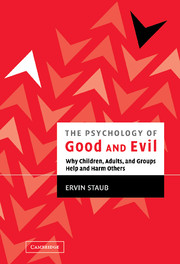Book contents
- Frontmatter
- Contents
- Preface
- Acknowledgments
- PART I INTRODUCTION AND CORE CONCEPTS
- PART II THE ROOTS OF HELPING OTHER PEOPLE IN NEED IN CONTRAST TO PASSIVITY
- PART III HOW CHILDREN BECOME CARING AND HELPFUL RATHER THAN HOSTILE AND AGGRESSIVE
- PART IV THE ORIGINS OF GENOCIDE, MASS KILLING, AND OTHER COLLECTIVE VIOLENCE
- PART V THE AFTERMATH OF MASS VIOLENCE: TRAUMA, HEALING, PREVENTION, AND RECONCILIATION
- 33 Preventing Group Violence
- 34 Kosovo: The Need for Flexible Bystander Response
- 35 The Effects of Violence on Groups and Their Members
- 36 Healing, Reconciliation, and Forgiving after Genocide and Other Collective Violence
- 37 Healing, Forgiveness, and Reconciliation in Rwanda: Project Summary and Outcome, with Addendum on Other Projects
- 38 Further Avenues to Prevention
- 39 Commentary: Human Destructiveness and the Refugee Experience
- 40 A Vision of Holocaust Education in Holocaust Centers and Schools
- 41 Out of Hiding
- 42 Review of Legacy of Silence: Encounters with Children of the Third Reich
- 43 What Can We Learn from This Tragedy? A Reaction Days after September 11, 2001
- PART VI CREATING CARING, MORALLY INCLUSIVE, PEACEFUL SOCIETIES
- Appendix: What Are Your Values and Goals?
- Index
- References
34 - Kosovo: The Need for Flexible Bystander Response
Published online by Cambridge University Press: 07 May 2010
- Frontmatter
- Contents
- Preface
- Acknowledgments
- PART I INTRODUCTION AND CORE CONCEPTS
- PART II THE ROOTS OF HELPING OTHER PEOPLE IN NEED IN CONTRAST TO PASSIVITY
- PART III HOW CHILDREN BECOME CARING AND HELPFUL RATHER THAN HOSTILE AND AGGRESSIVE
- PART IV THE ORIGINS OF GENOCIDE, MASS KILLING, AND OTHER COLLECTIVE VIOLENCE
- PART V THE AFTERMATH OF MASS VIOLENCE: TRAUMA, HEALING, PREVENTION, AND RECONCILIATION
- 33 Preventing Group Violence
- 34 Kosovo: The Need for Flexible Bystander Response
- 35 The Effects of Violence on Groups and Their Members
- 36 Healing, Reconciliation, and Forgiving after Genocide and Other Collective Violence
- 37 Healing, Forgiveness, and Reconciliation in Rwanda: Project Summary and Outcome, with Addendum on Other Projects
- 38 Further Avenues to Prevention
- 39 Commentary: Human Destructiveness and the Refugee Experience
- 40 A Vision of Holocaust Education in Holocaust Centers and Schools
- 41 Out of Hiding
- 42 Review of Legacy of Silence: Encounters with Children of the Third Reich
- 43 What Can We Learn from This Tragedy? A Reaction Days after September 11, 2001
- PART VI CREATING CARING, MORALLY INCLUSIVE, PEACEFUL SOCIETIES
- Appendix: What Are Your Values and Goals?
- Index
- References
Summary
The many failures of response by the international community were followed by a very delayed but effective response in Bosnia. Once serious bombing of the Serb military began, it speedily led to a halting of violence, followed by the Dayton peace negotiations. Even in Kosovo, the response was delayed: Warnings about potential violence in Kosovo had started to come in the late 1980s. The bombing began after negotiations and after significant ethnic cleansing had taken place (Adelman, 1999). But, at least, there was a bystander response before large-scale violence.
A likely reason for this was awareness of, attention to, and a commitment that has developed in Bosnia to stopping Serb aggression, an evolution in a positive direction. The same leaders were on the scene. The failure of a response in Rwanda, and the apology by President Clinton to the Rwandan people that acknowledged responsibility, may have added at least to his motivation to act. This evolution has not led, however, to the creation of international institutions that might be helpful in other crises. The specificity of concern and commitment does not offer the hope of more active bystandership by the community of nations.
Given that bombing stopped Serb aggression in Bosnia, it was understandable that the same method was tried in Kosovo. But this was a different situation, given the symbolic meaning of Kosovo for Serbs, their view of it as essential to their identity.
- Type
- Chapter
- Information
- The Psychology of Good and EvilWhy Children, Adults, and Groups Help and Harm Others, pp. 428 - 429Publisher: Cambridge University PressPrint publication year: 2003



